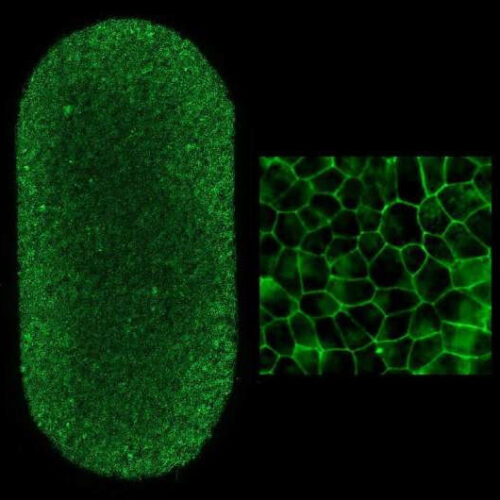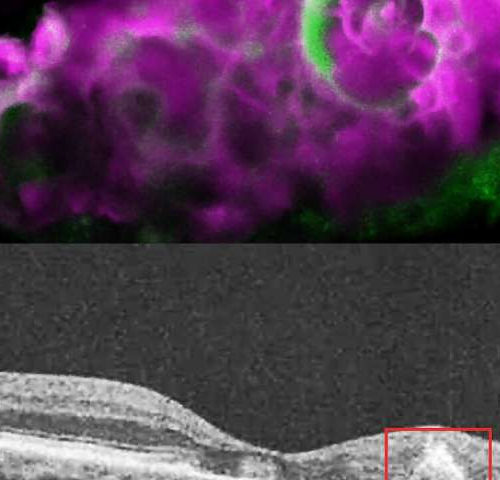Edited by Javed Choudhury November 22, 2024 033 Added to Email Alert TOPLINE: Moderate alcohol consumption was associated with a lower risk for progression to late age-related macular degeneration (AMD) in men. Geographic atrophy (GA) progression developed more quickly in women. METHODOLOGY: TAKEAWAY: IN PRACTICE: “Although some of these associations may also relate to confounding,...
Tag: <span>AMD</span>
First US patient receives autologous stem cell therapy to treat dry AMD
by National Institutes of Health Left shows an image of the full-RPE-patch (2 x 4 mm). Each dot is an RPE cell with the borders stained green. Each patch contains approximately 75,000 RPE cells. Right image shows patch RPE cells at higher magnification. Credit: Kapil Bharti, Ph.D., NEI At the National Institutes of Health, a surgical...
Researchers discover tooth-enamel protein in eyes with dry AMD
by National Eye Institute A protein that normally deposits mineralized calcium in tooth enamel may also be responsible for calcium deposits in the back of the eye in people with dry age-related macular degeneration (AMD), according to a study from researchers at the National Eye Institute (NEI). This protein, amelotin, may turn out to be...
Solving long-sought protein structure opens new avenues for treating disease
by Sanford Burnham Prebys Medical Discovery Institute Scientists at Sanford Burnham Prebys have identified the long-sought structure of an essential blood protein: vitronectin. Knowing the protein’s structure—an advance that enables rational drug design—could lead to medicines that kill multi-drug-resistant bacteria, halt cancer metastasis, treat age-related macular degeneration (AMD) and more. The study was published in...
Eye-in-a-dish’ model helps scientists to uncover ‘surprising’ AMD gene variant
By Lois Zoppi, BA Reviewed by Kate Anderton, B.Sc. (Editor) Researchers at the University of California, San Diego (UCSD) have uncovered a new genetic variant responsible for blood vessel dysregulation in the development of age-related macular degeneration (AMD), a retinal eye disease whose exact cause is yet to be discovered. The study was published in the journal Stem Cell Reports on 9th May 2019. What is Age-related Macular Degeneration (AMD)? Age-related macular...
Faulty molecular master switch may contribute to AMD
A signaling pathway controlled by transforming growth factor beta (TGF-beta) could be involved in the progression of age-related macular degeneration (AMD). Researchers at the National Eye Institute (NEI), part of the National Institutes of Health, have found that interrupting TGF-beta signals to immune cells called microglia causes the cells to enter an activated, inflammatory state....
Calcifications in the eye increase risk for progression to advanced AMD by more than six times
Calcified nodules in the retina are associated with progression to late stages of age-related macular degeneration (AMD). Experts from Queen’s University Belfast, working in partnership with the University of Alabama of Birmingham and in collaboration with UK material scientists and US clinical ophthalmology practices, made the ground-breaking discovery that the calcified nodules in the retina...
Trigger for most common form of vision loss discovered
Jayakrishna Ambati, M.D., (left) and Nagaraj Kerur, Ph.D., have discovered a crucial trigger for macular degeneration, a condition which robs millions of their sight. The discovery may allow doctors to intervene early to halt the process. Credit: Josh Barney | UVA Health System In a major step forward in the battle against macular degeneration, the...
Stem Cell Therapy Shows Promise for Common Cause of Blindness
Two studies show cell-based treatment is safe in patients with dry macular degeneration, with one showing improved vision NEW ORLEANS, Nov. 14, 2017 /PRNewswire/ — Results from two early clinical trials show that it may be possible to use human embryonic stem cells as treatment for the dry form of macular degeneration, according to presentations given today at...
Do vitamin supplements prevent macular degeneration?
There’s evidence vitamins can slow the progression of existing macular degeneration. Vitamin and mineral supplements won’t prevent the development of age-related macular degeneration. But there is some evidence taking supplements containing vitamin C, vitamin E and zinc may slow the progression of age-related macular degeneration in those who already have it. This evidence comes from two major...
- 1
- 2


